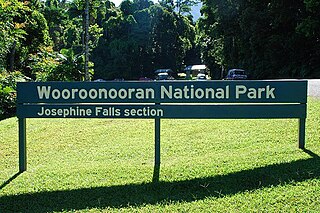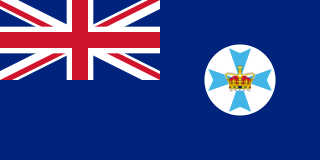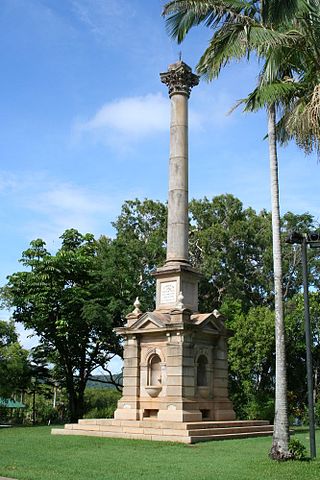Endeavour Reef is a coral reef within the Great Barrier Reef. It is within the Shire of Cook, Queensland, Australia. [1] On 11 June 1770, the HM Bark Endeavour under the command of Lieutenant James Cook struck the reef and ran aground.
Endeavour Reef is a coral reef within the Great Barrier Reef. It is within the Shire of Cook, Queensland, Australia. [1] On 11 June 1770, the HM Bark Endeavour under the command of Lieutenant James Cook struck the reef and ran aground.

The reef was encountered by Lieutenant James Cook when HM Bark Endeavour ran aground there on 11 June 1770. In his journals, Cook described striking the south-eastern end of the reef at 11pm after having passed just north of Pickersgill Reef [2] about one hour before. [3] Cook named the reef Endeavour Rocks. [1]
The Endeavour crew discarded six cannons and ballast in order to refloat the ship. Hans Hass searched unsuccessfully for the cannons during several dives in December 1952. [4] In 1969 an underwater search discovered the six abandoned cannons and ballast. [5]
The reef is about 7 kilometres (4.3 mi) long and runs in an east–west direction. The center of the reef is located at 15°46′41″S145°34′53″E / 15.77806°S 145.58139°E . [1] It is about 6 kilometres (3.7 mi) south-east of the Hope Islands in the Hope Islands National Park and 12 kilometres (7.5 mi) off the mainland.
Philip Parker King described the region in his Voyages for the Survey of the Intertropical coasts of Australia Volume 2 following his expeditions between 1818 and 1820. [6] King described the reef as being "... nine miles long; it lies in a North-West direction; the north end, in 15 degrees 39 minutes South, bears due from the North-east Hope." and stated that there was a dry rock on the western edge "... in latitude 15 degrees 39 minutes 55 seconds." It is probable that he was referring to Cairns Reef which is further to the north. [7]
Of the six cannons recovered, they are held by the following museums:

Endeavour River National Park is a national park in Queensland, Australia, gazetted to protect and preserve some of the natural and cultural resources in and around the mouth of the Endeavour River, immediately north of the small town of Cooktown. The park is located 1,561 kilometres (970 mi) northwest of Brisbane.

Fitzroy Island National Park is a gazetted protected area covering Fitzroy Island, in Far North Queensland, Queensland, Australia. Fitzroy Island, is a continental island located 22 kilometres (14 mi) east of Cairns on the mainland.

Hope Islands National Park is a national park in Queensland (Australia) 1,521 km north-west of Brisbane. The park consists of four islands: East Hope and West Hope, Snapper Island and Struck Island.

Lizard Island, also known as Jiigurru or Dyiigurra, is an island on the Great Barrier Reef in Queensland, Australia, 1,624-kilometre (1,009 mi) northwest of Brisbane. It is part of the Lizard Island Group that also includes Palfrey Island, and also part of the Lizard Island National Park. Lizard Island is within the locality of Lizard in the Cook Shire. The traditional owners of the Lizard Island group are the Aboriginal Australian clan known as the Dingaal people.

Wooroonooran National Park is a national park in Queensland, Australia, 1,367 km northwest of Brisbane, between Innisfail and Cairns.

HMS Endeavour was a British Royal Navy research vessel that Lieutenant James Cook commanded to Tahiti, New Zealand and Australia on his first voyage of discovery from 1768 to 1771.

The Guugu Yimithirr, also spelt Gugu Yimithirr and also known as Kokoimudji, are an Aboriginal Australian people of Far North Queensland, many of whom today live at Hopevale, which is the administrative centre of Hopevale Shire. At the 2011 census, Hopevale had a population of 1,005 people. It is about 46 kilometres (29 mi) from Cooktown by road. It is also the name of their language. They were both a coastal and inland people, the former clans referring to themselves as a "saltwater people".
Guugu Yimithirr, also rendered Guugu Yimidhirr, Guguyimidjir, and many other spellings, is an Australian Aboriginal language, the traditional language of the Guugu Yimithirr people of Far North Queensland. It belongs to the Pama-Nyungan language family. Most of the speakers today live at the community of Hope Vale, about 46 kilometres (29 mi) from Cooktown. However, as of June 2020 only about half of the Guugu Yimithirr nation speak the language. As such, efforts are being made to teach it to children. Guugu Yimithirr is the source language of the word kangaroo.

Laura is a rural town and locality in the Shire of Cook, Queensland, Australia. In the 2021 census, the locality of Laura had a population of 133 people.

Lakeland is a rural town and locality in the Shire of Cook, Queensland, Australia. In the 2021 census, the locality of Lakeland had a population of 333 people.

Hope Vale is a town within the Aboriginal Shire of Hope Vale and a coastal locality split between the Aboriginal Shire of Hope Vale and the Shire of Cook, both in Queensland, Australia. It is an Aboriginal community. In the 2021 census, the locality of Hope Vale had a population of 1,004 people.

The Endeavour River, inclusive of the Endeavour River Right Branch, the Endeavour River South Branch, and the Endeavour River North Branch, is a river system located on Cape York Peninsula in Far North Queensland, Australia.

Cape Tribulation is a headland and coastal locality in the Shire of Douglas in northern Queensland, Australia. In the 2021 census, Cape Tribulation had a population of 123 people.

Far North Queensland (FNQ) is the northernmost part of the Australian state of Queensland. Its largest city is Cairns and it is dominated geographically by Cape York Peninsula, which stretches north to the Torres Strait, and west to the Gulf Country. The waters of Torres Strait include the only international border in the area contiguous with the Australian mainland, between Australia and Papua New Guinea.

Green Island is a marine island and locality in the Cairns Region, Queensland, Australia. In the 2021 census, Green Island had a population of 20 people.

Cooktown is a coastal town and locality in the Shire of Cook, Queensland, Australia. Cooktown is at the mouth of the Endeavour River, on Cape York Peninsula in Far North Queensland where James Cook beached his ship, the Endeavour, for repairs in 1770. Both the town and Mount Cook which rises up behind the town were named after James Cook.

The Colony of Queensland was a colony of the British Empire from 1859 to 1901, when it became a State in the federal Commonwealth of Australia on 1 January 1901. At its greatest extent, the colony included the present-day State of Queensland, the Territory of Papua and the Coral Sea Islands Territory.
Rossville is a town and coastal locality in the Shire of Cook, Queensland, Australia. In the 2021 census, the locality of Rossville had a population of 253 people.

Cooks Monument and Reserve is a heritage-listed memorial at Charlotte Street, Cooktown, Shire of Cook, Queensland, Australia. It was designed in the office of the Queensland Colonial Architect and built by Hobbs and Carter in 1887. It was added to the Queensland Heritage Register on 30 April 1997.

Cooktown Museum is a heritage-listed former convent and school and now museum at Furneaux Street, Cooktown, Shire of Cook, Queensland, Australia. It was designed by Francis Drummond Greville Stanley and built from 1888 to 1889 Hobbs & Carter. It was formerly known as St Mary's Convent and School. It was added to the Queensland Heritage Register on 21 October 1992.